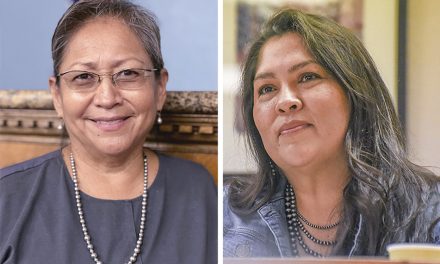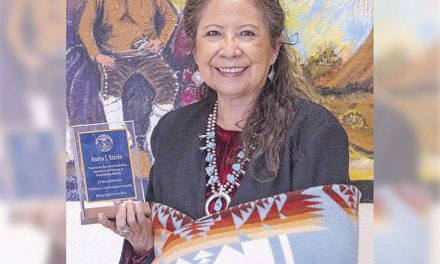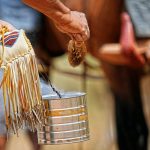
‘Don’t give up hope’: Pandemic will be defeated, Fauci assures
WINDOW ROCK
Dr. Anthony Fauci, the country’s top infectious disease expert, shared words of encouragement for the Navajo Nation, now facing another significant surge in coronavirus cases, mirroring a national trend.

Submitted
Dr. Anthony Fauci
“This is going to end,” said Fauci in an exclusive interview with the Navajo Times. “We are going to defeat this pandemic.
“Don’t give up hope,” he said. “Try to protect yourself from getting infected. Wear a mask, avoid crowds, keep physical distance.
“Try and do things more outdoors versus indoors,” he said. “Wash your hands as often as you can. We’re going to get through this, together.”
Fauci, director of the National Institute of Allergy and Infectious Diseases, said a vaccine will be available “within a reasonable period of time.”
“When that comes, it’s going to diminish the risk of infection substantially, so don’t give up — hang in there,” he said.
Fauci believes that the spike in coronavirus cases across the country is related to the change in seasons and “COVID-19 fatigue” when it comes to adhering to the strict public health measures in place.
“It kind of wears you down and people may not be following them as strictly as they otherwise would,” he said.
He added that as we enter the cool months of mid-fall and winter people are also spending more time indoors.
“When you’re dealing with a respiratory-born illness, that’s always a major factor in the transmissibility and acquisition of infection,” he said.
Anything that increases the likelihood that people will be congregating together indoors, especially without masks, is a risk, he added.
Fauci acknowledged that while there are different strains and mutations of the coronavirus, he does not believe that is the cause of the increase in COVID-19 cases that we are seeing.
He emphasized the importance of wearing facemasks over both mouth and nose.
“A mask that is not worn properly does not get the full benefit for what masks are meant for,” he said. “Masks are meant to cover the entire nose, making sure the nostrils are not exposed as well as the mouth.”
When someone has the mask pulled down below the nose, he said, half of the exposure area is vulnerable whereas if the mask is worn correctly both of the mucosal areas are protected.
Developing immunity
Fauci estimates that a vaccine, which he believes is the best way to develop “herd immunity,” could be available by the end of 2020.
“I think by the end of the year or the beginning of 2021, you’ll likely start seeing doses of vaccine being distributed to the highest priority people, including health care and frontline workers as well as individuals who have underlying conditions that make them vulnerable to serious outcomes,” he said.
As a public service, the Navajo Times is making all coverage of the coronavirus pandemic fully available on its website. Please support the Times by subscribing.
How to protect yourself and others.
Why masks work. Which masks are best.
Resources for coronavirus assistance
Regardless, Fauci said that the coronavirus is likely to be with us into the future, much like other viruses.
He referenced the 1918 Spanish flu pandemic, which took the lives of over 2,000 Diné.
“The 1918 flu did not just go away,” said Fauci. “Various versions of that flu in much less virulent form have been with us for decades and decades. In fact, the 1918 flu is the great-great-grandmother of the flus we see now. It’s just much less virulent because we’ve gotten used to that kind of virus.”
He said the reasons we do not disrupt our lives on a seasonal basis because of the flu is because it does not kill people the way COVID-19 does. We have vaccines for the flu, and most people in the population have some degree of immunity against the flu.
Similarly, while Fauci does not think COVID-19 will be eradicated entirely, he believes that with a good vaccine and good background immunity we will not have the virus in its epidemic and pandemic form for a very long period of time.
“It might take a year or so more from now to get it to the point where it’s so well under control that we’re not disrupting our lives because of it,” said Fauci. “It’s not going to disappear completely, but it’s certainly not going to be a pandemic threat that it is right now.”
Treatments
On another positive note, Fauci said the mortality rate due to COVID-19 has definitely gone down, which has certainly been the case on the Navajo Nation.
“We’re getting much better at treating people,” said Fauci. “We have medications that we know work and we have more experience.”
This is one of the benefits of continuing to “flatten the curve” of COVID-19 cases because it buys more time to understand the virus.
Fauci recommends that if someone infected with COVID-19 is starting to have trouble with their breathing, they should seek treatment immediately.
“I think if a person is having difficulty breathing and their oxygenation is low, they should very likely go to a hospital,” said Fauci. “You don’t want to wait until you’re in dire straits where you can barely breathe.”
Fauci said the steroid Dexamethasone is being used successfully in people with advanced disease who are hospitalized and either require a mechanical ventilator or high flow oxygen.
“Dexamethasone is a good treatment that diminishes the death rate, for sure,” he said.
A number of other medicines are also being tested to see if they are effective early in the course of disease, he said.
“None of them have yet been proven definitively to be safe and effective although some of them are promising and we hope that soon they will be available on a more widespread basis,” said Fauci.
In terms of availability of adequate hospital capacity and the health care staffing in addressing the COVID-19 surge response, Fauci said that much of that will depend on what part of the country people are in.
“When we had the very big surge of cases in the spring, they were mostly focused in the big cities like New York, Chicago, New Orleans and Boston,” he said. “They almost, but did not quite, run out of capacity. They were stretched, but they were not overrun.”
However, he said that could possibly happen if the COVID-19 cases continue to climb at a rapid rate, which is why it is good to prepare now.
“The smaller hospitals in more rural areas may need some help because they may not have the back-up to be able to handle a larger number of cases,” he said.
‘My secret is exercise’
In the meantime, Fauci recommends people take good care of themselves as a preventive measure.
Fauci said his key to staying healthy is engaging in physical activity outdoors every day as a way to relieve stress and enjoy nature.
“I try to pace myself,” said Fauci. “I work very long hours. My secret is exercise. I power walk about four miles a day. That’s the key to my sanity.”
Fauci says he and his wife “walk and talk” together.
“We also are bird-watchers, both of us,” said Fauci. “When we see birds, we point them out to each other.”
In terms of going out for essentials like the rest of us, Fauci said when he goes food shopping, he does not wipe down the groceries.
“The only thing I do is wash my hands frequently,” he said. “I don’t need to wash down the packages of the food. I usually take carry-out food because I like to support the restaurants in my neighborhood because I know they’re suffering.
“When I bring the bag home, I only wash my hands,” he said. “I don’t have to worry about scrubbing down the bags or anything like that.”
Fauci said there has been no indication of people getting COVID-19 from eating food and droplets of the virus on surfaces are less important than breathing it in the air.
“It’s mostly transmitted from person to person,” he said.
Respiratory droplets that contain the virus, whether big or small, are the primary source of transmission, said Fauci.
“You can do that through sneezing, coughing, breathing, singing or talking,” he said.







 Highway 264,
Highway 264, I-40, WB @ Winslow
I-40, WB @ Winslow